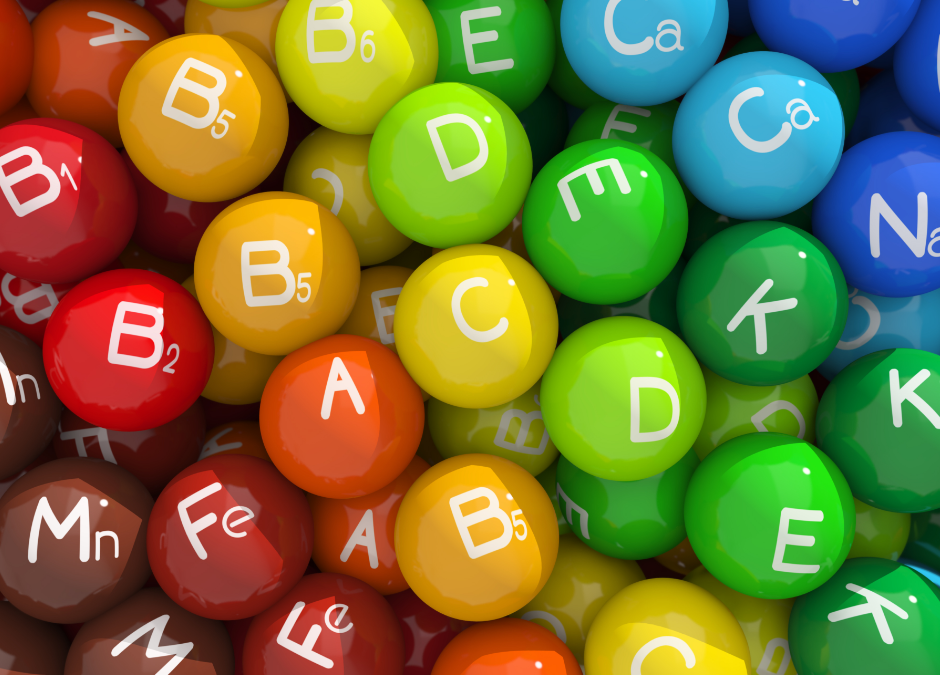In my last two posts I went over the macronutrients; carbohydrates, proteins, and fats. Today I am going to cover micronutrients. Micronutrients include vitamins, minerals and trace elements.
If you read the first post of the series you understand my goal was to simplify nutrition. As I pondered what to write about the micronutrients I realized I could not possibly share everything and make it simple, so I am going to stick with the basics.
Vitamins and minerals play a part in every process that takes place in the body. This is why it is important to eat a variety of whole foods. Your body only needs a small amount, that is why the term micronutrients is used.
Vitamins are play an essential role in metabolism, growth and development. There are two types of vitamins, fat soluble and water soluble. Fat soluble vitamins are (A,D,E and K). Dissolve in fat. All other vitamins dissolve in water. Since A,D,E and K are stored in fat, there can have harmful affects if you ingest too much over a period of time. Since water soluble vitamins are excreted in urine there is less chance for negative affects, but you still do not want to take take water soluble vitamins in excess. These vitamins can also have harmful affects to the body when overused. Vitamins are found in fruits, vegetables and legumes.
Minerals regulate body processes and give your body structure. There are major minerals and trace minerals. Your body does not make minerals on its own, so it is imperative you get the right minerals in your diet. Three of the major minerals are calcium, magnesium, and potassium. While calcium is found in dairy and dairy alternatives magnesium and potassium are found in are mostly found in fruits and vegetables. Great magnesium dense foods are dark leafy greens, legumes and nuts. Potassium is found in red peppers, spinach, tomatoes and of course bananas.
And finally, trace elements. Trace elements are a small part of our diet, but needed for body process’. There are a number of trace minerals. Some of the most talked about are iron, zinc, and chromium. For the purpose of keeping it simple I am not going to cover all the trace minerals and their process’. If you are eating a well balanced diet of whole foods, including green vegetables, lean meats, legumes, nuts, whole grains, and a dairy or dairy alternative you will get what you need.
Phew, a lot of information! But at the very least, I hope you learned why it is important to eat a variety of whole foods!
About
 With Karen's education and eighteen years experience in the preventative health, nutrition, and fitness fields and personal experience battling weight, she could not ignore the growing obesity epidemic, especially after the announcement by the surgeon general stating, this would be the first generation to die before their parents due to obesity. This is not a legacy Karen wants to leave behind. More...
With Karen's education and eighteen years experience in the preventative health, nutrition, and fitness fields and personal experience battling weight, she could not ignore the growing obesity epidemic, especially after the announcement by the surgeon general stating, this would be the first generation to die before their parents due to obesity. This is not a legacy Karen wants to leave behind. More...
Most Recent Posts
Catagories
- Celebrity Weight Loss
- Childhood Obesity
- Diet pills
- Diets
- Emotional Eating
- Exercise
- Fad Diet
- Fitness
- Healthy behaviors
- Holiday eating
- Kids Health
- Mindset
- Nutrition
- Nutrition Coach
- Over eating
- overweight
- Overweight kids
- Physical activity
- Podcast
- Stress
- Uncategorized
- Weight Loss
- Weight Loss Coach
- Weight Management
Archives
- October 2021
- September 2020
- February 2013
- January 2013
- November 2012
- November 2011
- October 2011
- September 2011
- August 2011
- July 2011
- February 2011
- January 2011
- December 2010
- November 2010
- October 2010
- September 2010
- August 2010
- July 2010
- June 2010
- March 2010
- February 2010
- December 2009
- November 2009
- October 2009
- September 2009
- August 2009
- July 2009

